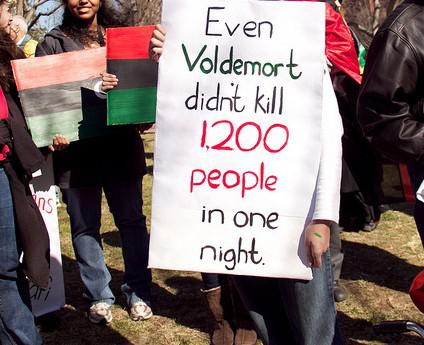 |
| Tahrir Square, Egypt via: http://www.nato.int/docu/Review/2012/Arab-Spring/Squaring-circle-Arab-uprisings/EN/index.htm |
During the fall semester last year, I took a class exploring the idea of information communities. We had discussions throughout, and our final assignment was a research paper about the information community of our choice. As part of our discussions, we had to write short, directed blurbs and share them with the class. Even though that class is well behind me now, I still find the ideas fascinating, and so I wanted to share some of my ideas here.
So this is the first in a series, and in this post, I present the idea that the protesters who participated in the Arab Spring were an information community.
________________
The Arab Spring was a series of protests, demonstrations, riots, and civil wars that first began in Tunisia in December 2010. From there, dissent spread throughout the region, and, ultimately, events ranging from marches to civil wars took place in twenty-two countries. Syria, Iraq, and Libya remain embroiled in civil war, while many of the other countries involved experience various levels of turbulence to this day.
 |
| Conflicts by country. via: http://www.targetmap.com/viewer.aspx?reportId=9600 |
The use by protesters of cell phones and social media to incite and organize their fellow citizens and to document their treatment by government forces was revolutionary in its own right. Facebook, especially, but also Twitter and text messaging were used to share information amongst protesting citizens and with the rest of the world. Social media has an inherent “multiplier effect for stakeholders” (Fisher & Durrance, 2003, p. 659) in that communication between two or more people defaults to public access. This means that any conversation amongst a small group can be seen by the social circles of each participant. The information is easily shared multiple times without corrupting it (no game of telephone here; it’s word-for-word sharing), which ensures that any interested parties have the right information at the right time. Protesters, journalists, and other “diverse groups” (Fisher & Durrance, 2003, p. 659) were able to converge upon city squares with precision, as well as share information, updates, and results.
 |
| via: http://www.bbc.com/news/world-middle-east-16212447 |
This social media uprising came about as a way for ordinary citizens to get out from under the thumbs of authoritarian regimes. The governments of these countries had long suppressed free speech through laws, intimidation, force, and censorship. Protesters use of Facebook during the Arab Spring formed “around people’s needs to access and use information” (Fisher & Durrance, 2003, p. 659) out from under the umbrella of state controlled media outlets. This virtual meeting space “removed[ed] barriers to information about acquiring needed services and participating in civic life” (Fisher & Durrance, 2003, p. 660). In other words, the protesters use of Facebook and other social media allowed them to speak freely and share information about participating in demonstrations against their authoritarian governments.
Having an online information community of protesters helped cause the domino effect that spread unrest through the Arabian Peninsula and North Africa because it “foster[ed] social connectedness within the larger community (Fisher & Durrance, 2003, p. 660). That “larger community” also included much of the world, which helped bring international attention to their causes and international outrage over their treatment.
 |
| via: http://www.livebinders.com/play/play?id=374756 |
Fisher, K., & Durrance, J. (2003). Information communities. In K. Christensen, & D. Levinson (Eds.), Encyclopedia of community: From the village to the virtual world. (pp. 658-661). Thousand Oaks, CA: SAGE Publications, Inc.

Six years ago, naively, I still thought humanity truly desired freedom and to be able to carve out lives and destinies of their own. Even the fantastic technological breakthroughs in public communications, and the information sharing ability has shown that essentially, the only thing humanity has ever agreed on, and that is to be ruled over by others. Too bad. ;-{ >
ReplyDelete